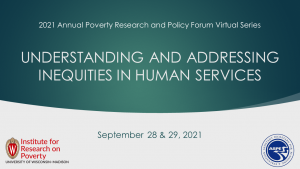NEW IRP EVENTS
- July
- July 23Current Research on Alternative Educational and Training PathwaysInstitute for Research on Poverty Webinar - Shaun Dougherty, Maura Kelly, and Di Xu1:00 PM, Online
News
Job Opportunity
New Resources
![]()
Expanded SNAP Benefits During the COVID-19 Pandemic: Lessons Learned
Cindy Leung, Marianne Bitler, and Chloe Green
![]()
Recognizing the Diversity of Fathers and Families in Child and Family Services
Tova Walsh, Alvin Thomas, Cristina Wilson, and Darryl Davidson
Highlights from the National Research Center on Poverty and Economic Mobility
 This Forum investigated inequitable outcomes by race, ethnicity, sexual orientation, gender identity, sex, and ability and how federal, state, and local human services policies, systems, and providers contribute to it. Participants also discussed how policy, practice, data, and research can combat systemic inequities created in and outside of human services. Inequities continue to create barriers to success and well-being for many individuals and communities in the United States. The field of human services can play a crucial role in advancing equity for these populations, but to do so must identify the ways in which it creates or perpetuates disparities.
This Forum investigated inequitable outcomes by race, ethnicity, sexual orientation, gender identity, sex, and ability and how federal, state, and local human services policies, systems, and providers contribute to it. Participants also discussed how policy, practice, data, and research can combat systemic inequities created in and outside of human services. Inequities continue to create barriers to success and well-being for many individuals and communities in the United States. The field of human services can play a crucial role in advancing equity for these populations, but to do so must identify the ways in which it creates or perpetuates disparities.
Medicaid & Health Policy Research
Health Coverage, Access, Cost, & Quality
Research and analysis projects focus on health care access, cost, financing, health system performance, quality — in short: What works? Who benefits? Who pays?

